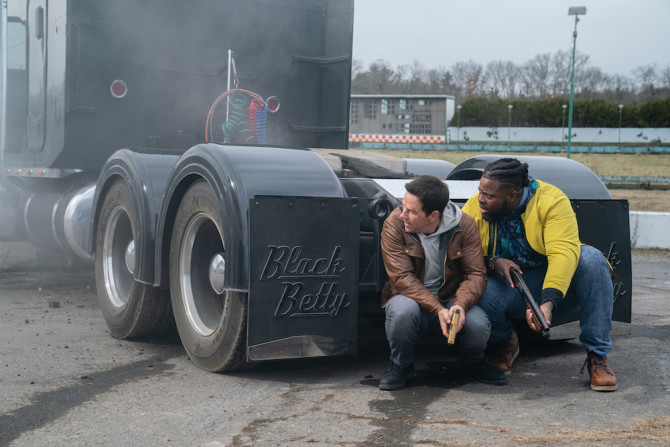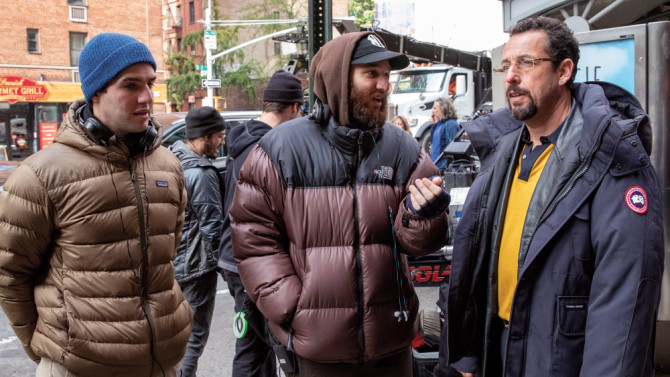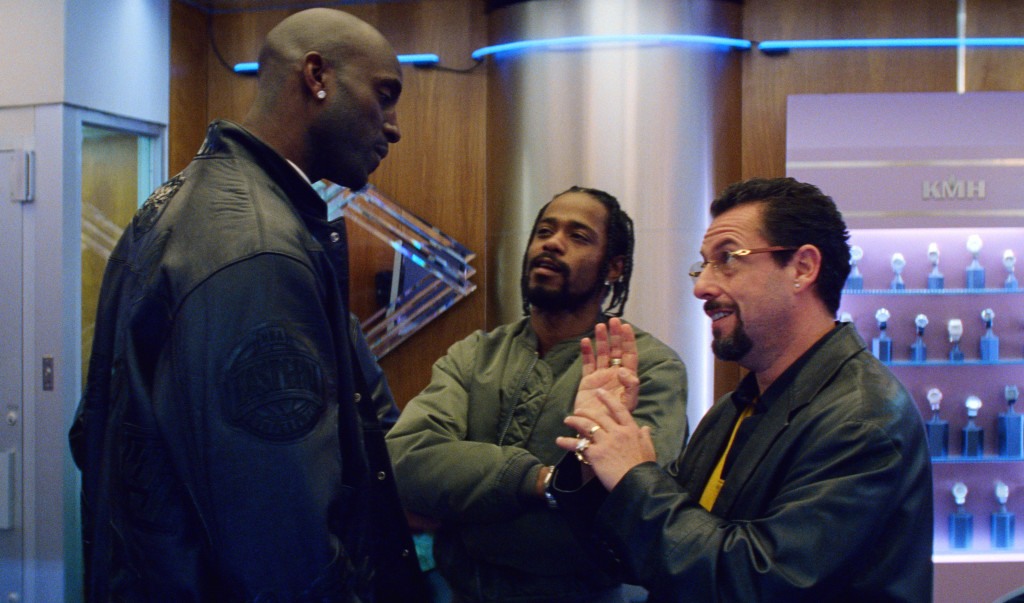Genre: Japanese Manga – TV Pilot (One Hour)
Premise: Based on the manga comic, numerous pirates sail the seas in search of the famed treasure known simply as “One Piece.”
About: I’m told One Piece is the most successful selling manga comic in Japanese history. And since only Disney and Sony have superheroes, everyone else needs to find their fantastical subject matter from elsewhere. It was only a matter of time, then, that someone, in this case, Netflix, would take a big-budget chance on a manga comic. And if you’re going to go for it, you have to go big. So of course they have to adapt the best manga of all time.
Writer: Matt Owens (based on One Piece by Eiichiro Oda)
Details: 57 pages
So far, I am yet to understand any Japanese adaptation of anything I’ve ever read or seen that is not horror. The Cowboy Bebop script was indecipherable from a phone book written with sluglines. When the Wachowskis adapted Speed Racer, I stared at the screen in bafflement for 30 minutes before dropping a five ton brick on my remote control power button to make sure I would never risk seeing the film again. For a while, I tried to get into famous Japanese novelist, Haruki Hurakami. I reluctantly traversed past the 200 page mark in a couple of his novels before I realized that there was no point to either of them (I dare anyone to make an argument that IQ84 makes sense). Most recently, I made the mistake of watching the movie, “Your Name,” and found it the most hackneyed simplistic boring piece of cinema that anyone had made that year.
Clearly, the Japanese view storytelling in a different manner from the rest of the world. My theory is that they care more about the animation than the story. And when they do tell stories, they’re not interested in goals or points. It’s more about the experience of the people’s lives. Which is great if you love boredom. But someone’s going to have to explain to me why people like these movies. If you could give me anything I could latch onto to help understand the popularity of this comic and every other Japanese comic or animated film, I’m game to learn. While you do that, I’m going to review One Piece.
One Piece begins with a pirate being marched through the Town of Beginnings on a remote island. This man is brought to an execution platform in the middle of town. The Mayor wants to make an example of him that pirates are bad people. Just as he’s about to be killed, someone in the audience yells out, “Where’s your famous treasure!?” And the pirate says that every treasure he’s ever found was put together into “one piece” and just before he can reveal where this one piece is, they kill him.
This sparks a massive pirate uprising where everyone now wants to be a pirate so they can search for the “One piece.” 12 years later we meet Shanks, a red haired pirate who is the leader of the Red Haired Pirates. While his crew drinks at a bar, a little 7 year old kid named Monkey D. Luffy pleads to be part of Shanks’s crew. Shanks keeps telling him he’s got no shot and to stop bothering him.
While no one’s looking, Luffy eats a weird fruit in Shanks’ storage chest and then – get ready for this – becomes super-stretchy kid. If you hold onto his arm and walk around the room, his arm will follow you, stretching out endlessly. Yeah, that’s what we’re working with here. Shanks is furious that Luffy ate this prized super-powers fruit cause now he can’t sell it. But before he can yell at him, a criminal named Higuma shows up with his crew and start yelling at Shanks’s guys.
While everyone fights, Higuma steals Luffy away and takes him on his boat to… I don’t know what. Yell at him on the sea? But before he can yell, a giant sea monster swallows Higuma whole. Meanwhile, Luffy falls in the water and sinks because – I’m not making this up – the super powers fruit contains a “can’t swim” curse. So Luffy is about to die before Shanks scoops him back up and saves him.
Cut to 10 years later cause, of course, and we meet the beautiful but mean Pirate Avida, who takes special pleasure in yelling at some teenager she found, Koby. Koby wants nothing more than to escape Avida. Lucky for him, he finds Luffy stowing away in one of their barrels! Luffy, who’s now 17, is really brave and determined to find the “one piece.” He tells Koby to stand up to his slave owner so Koby does and then the new BFFs Koby and Luffy go off to look for one piece together! Yay!
Holy Moses kill me now.
All right, so, it became clearer to me why there’s such a disconnect between myself and a lot of these Japanese animated movies/shows. They feel like they were written by a 10 year old boy. I’m not kidding. A kid eats a purple fruit and gains super-stretchy powers. When faced with death by a pirate, a giant sea monster appears and eats the boy’s captor. We also get dialogue like this: “Whatever. I don’t care what powers you have. They’re nothing compared to mine. I’m not gonna let some no- name punk stand in my way.”
This is stuff I would – no hyperbole here – expect to come out of an elementary school writing contest.
Which is too bad because the pilot actually starts strong. With every TV pilot, you want to come in with a scene that grabs the reader/viewer. Even more so than movies. Because in movies, the audience can’t leave. But with TV, the audience can leave any time they want. So to start this with a perp walk through an old island town, then have an execution, only for the executed man to scream out that there’s a treasure to find – that’s the beginning of a good show.
Then, when we get into the bar and Shanks encounters Higuma and we have a good old-fashioned standoff, I was thinking, “This is good so far.” Especially when Shanks backed down. In 99% of these early-script standoffs, they’re used to show the hero getting picked on and then beating the bigger badder guy up so we know he’s awesome. So to go the opposite direction and have Shanks wimp out was a refreshing choice.
I’m thinking, “This could actually be good.” And thennnnnnnn – purple fruit that turns kid into mr. stretchy pants happens. My head literally fell into my lap. I shook it several times. And I thought – yup, now you’re officially a Japanese adaptation.
But it wasn’t just the nonsensical lost-in-translation issues that made this a bad read. On page 28 we get our second large time jump. There is maybe no better indicator that a feature script or a TV pilot script is going to be bad than the double major time jump. We jumped forward 12 years. More story plays out. Then we jump forward 10 years.
First of all, it’s pure laziness. I understand why it was done. You wanted to see the pirate introduce the one-piece. And you wanted to show Luffy get his powers and then also grow up. But if you’re pushing us through multiple time periods to set up your story, you’re not working hard enough. Time jumps destroy the rhythm of the pilot. It’s hard enough to get the rhythm right when there are zero time jumps. So to start and stop your story TWO TIMES in a single pilot, you’re begging the viewer to turn the channel.
It’s the equivalent of that guy at the party who tells the story who keeps stopping and saying, “Oh, I forgot to tell you. That guy who gets the girl? He wasn’t always rich. He once worked at a dry cleaners and he had to work for a long time and save up money… where was I? Oh, right so he gets the girl and he’s about to ask her for her hand in marriage but first he’s got to meet her parents. Oh, I forgot. These parents? They’re from old money. So they grew up in New Orleans…” That’s the rhythm you’re creating when you’re doing double time jumps.
I give these guys props for taking something that’s so specific to its medium and trying to turn it into live action. I honestly don’t know how you even start to go about executing a goofy manga in live-action form. Something tells me you’re going to get a mix between the 1980 Robert Altman version of Popeye and the first Sonic The Hedgehog trailer. But we’re in a content-desperate industry and that means more chances need to be taken. We’ll see how this one turns out.
[x] What the hell did I just read?
[ ] wasn’t for me
[ ] worth the read
[ ] impressive
[ ] genius
What I learned: I would avoid the scene in your Western, Superhero, Sci-fi, or any combination thereof, where our hero is challenged early on by the bad guy and then the hero kicks his butt. Usually in a bar. I admired One Piece for not doing that. It reminded me that some beats in a story are so common, writers are incapable of visualizing any other option. But these are the story beats you need to question the most! Because these are the moments where you’re best able to show that your script is going to be different from everybody else’s.
Sometimes I think of Netflix as the alcoholic divorced neighbor we use as a measuring stick to feel better about ourselves. Their release strategies continue to both deconstruct and baffle the industry. This week I saw Mark Wahlberg and Eliza Schlezenzer on James Corden talking about a movie they did together and all I could think was, “What movie? They’re not in any movies together.” A few days later, I open up Netflix, and there’s a new movie with Mark Whalberg and Eliza Schlezenzer. Oh, I guess that was the movie?
Usually, studios blanket the country with billboards and trailers for their upcoming films so by the time the actors from the movie show up on talk shows, we know why they’re there. Netflix is saying, “No thank you” as they continue to alter every traditional strategy in the book. For what reason? No one knows. Honestly, I can’t figure out if there’s a plan behind this backwards promotional concept or if they’re making it up as they go along.
Either way, Spenser Confidential felt like one of those movies you hear about that has tons of weird lawsuits preventing it from being released so the studio has to keep it in the vault for several years and then when they finally release it, everything about the film feels strangely out of touch. Except in the case of Spenser Confidential, it wasn’t in the vault for 5 years. It was in it for 20. I mean this movie couldn’t feel more dated if it starred Harold Lloyd.
In that sense, Spenser Confidential represents just how much the movie industry has changed. These quasi-thriller dirty-cop dramas used to be a staple in every studio’s diet. But once special effects got better, TV production value skyrocketed, and the movie star died, it was hard to convince people these films were worth going to movie theaters for.
Which is probably why this film is debuting on Netflix.
And for anyone nostalgic about getting these movies back on the cineplex menu, watching Spenser Confidential may burst your bubble. All of the genre’s weaknesses are on display. Cliched characters. Predictable plot developments. Try-hard tough-guy dialogue.
Here’s the thing. It’s not that you can’t make these movies anymore. But you need to find a way to bring them to the modern audience. And the answer was right there in the film for “Spenser.” When Spenser (Mark Wahlberg), a former cop, gets out of prison (because of course he does) he’s forced to room with an on-the-rise MMA fighter.
There’s your modern thread right there. The MMA fighter (played by “US” star Winston Duke) makes the story modern. But they do NOTHING with his plot line. He’s there to nod his head whenever Mark Wahlberg asks, “Do you want to come with?” This movie should’ve focused on him. It should’ve been him getting out of prison. Not a former cop. WE’VE SEEN THE FORMER COP GET OUT OF PRISON ALREADY. Modernize this. I’m not even telling you this new direction would’ve been great. But it would’ve provided you with an opportunity to give this tired setup some fresh legs.
If you’re looking for a screenwriting tip that’s going to elevate your writing, this would be it. Look for old movie templates then find an element that makes them fresh. Because if all you’re doing is rehashing an old format, everybody’s going to react the same way: “This looks dated.” That’s what happened with Spenser Confidential.
Speaking of blasts from the pasts, we also got the mid-life crisis coach flick, The Way Back, this weekend, a script I reviewed last year which was pretty good. The film, which surprised a lot of people with its 87% RT score, had to call time out to stop the financial bleeding, making just over 8 million bucks.
Look, there have been a lot of complaints over the last decade that there’s nothing to see in theaters anymore unless you like Marvel or Vin Diesel leaping from buildings with a car strapped to his back. But who’s really to blame for this? Movies like The Way Back used to be a staple in theaters. You’d get a couple of them a year. Then people stopped going to see them so studios stopped making them. If you want more variety, you have to support these films. Plain and simple.
That’s what I never understood about this complaint. Every seasoned moviegoer is crying that they don’t make movies like they used to. There’s less and less variety. Well what, exactly, is missing from theaters that if they made them again, you’d go see? I’m serious. I’m asking that question for the comments. Steven Spielberg’s next film is West Side Story. Is it that kind of movie you’re missing? If so, are you going to go see it in theaters? I know I’m not.
If there’s a type of movie that used to be made and released that you miss, that’s the perfect opportunity for YOU to do something about it. Follow the formula I laid out above. Identify the movie type that’s no longer made. Come up with a fresh angle that modernizes it. And write it. Because let’s be real. The reason we didn’t go see The Way Back wasn’t because we’ve given up entirely on that kind of film.
We didn’t see it because it didn’t bring anything new to the table. I remember reading that script and a particular line of description stood out to me with how shocking it was. Here it is paraphrased: “We lean into the cliche because, why wouldn’t we, we’re going to be hitting all of them by the end of this movie.” THAT WAS IN THE SCRIPT! And I get that the writer, who was writing on assignment, was just having some fun. Maybe making an aside he knew the producer would giggle at. But if you want to know why this movie didn’t perform well, look no further than that line.
One of the hardest jobs of being a writer is refusing to settle. Not settling for average characters, not settling for average plot lines, not settling for average plot developments. Not settling for providing the same story people have already seen. Because let’s be honest. It’s much easier to write whatever comes to mind and call it a day. Those moments where you’re sitting on your couch doubting every inch of your story because you’re convinced the script blows and how nothing could ever possibly save it and you try this and try that and you keep going back to the drawing board and you’re just about to give up for good when – BAM! – an idea pops into your head that immediately makes your story ten times better? It’s not fun going through everything up til the ah-ha moment. It’s not fun beating yourself up for a week. Which is why most writers take the opposite approach and stick something in that they’ve seen work in other films, confident that, at the very least, the choice won’t be “bad.” But if you want to challenge others, you have to challenge yourself.
Finally, this leads us to the other major release of the weekend, “Onward,” Pixar’s latest effort, which has left a lot of people either shrugging or meh’ing or both. The film stars two of the most likable actors on the planet, Chris Pratt and Tom Holland, but we unfortunately don’t get to see them.
Personally, I find the story behind the story of this movie to be touching. The writer never met his father and so decided to write a movie about it. It even does what I just said you need to do. Which is come up with a new angle. Onward is unlike any movie Pixar has released before it. So what’s wrong here?
A couple of things. One of the frustrating cruelties of the artistic pursuit known as writing is that just because you try something different doesn’t mean it’s going to work. Most of the time, it doesn’t work because when you write something that’s off the beaten path, it requires you to be a better writer since you’re navigating uncharted territory. There have been many well-meaning writers who have tried something new but didn’t have the writing chops to execute it. While I’ve only seen Onward’s trailers, something about it I can’t put my finger on isn’t clicking. I think it’s the mythology. It feels too light and fluffy. There isn’t any depth there. With that said, I will definitely see this movie when it hits digital. It looks fun.
The second issue is that mainstream animation is one of the least-forgiving genres when it comes to its targeted demographics. Pixar and Disney movies are generally made for two types of people. Young kids and their parents. Onward isn’t that. It’s targeting 12-15 year olds. And I don’t think many 12-15 year olds go to see animated movies. They’re growing up. They’re too cool for school. Going to a Pixar film risks upsetting their street cred.
If you’re going to try something different with feature animation, it’s best to go way to the other extreme so that people understand the film isn’t meant for kids. Like Sausage Party. 12-15 year olds will want to see that because it’s raunchy and outrageous. I will concede that animation isn’t my specialty so take those thoughts with a grain of pink Himalayan salt. But that’s been my experience observing these films over the years. I think Pixar was trying to make something for all those little kids who grew up on their films who were now older. They learned the hard way that all of them would rather play Fortnite and try to be Tik-Tok stars.
Before we end this Monday mash-up, a final reminder that THIS FRIDAY IS SCI-FI SHOWDOWN! If you have a sci-fi script you want to be featured in the showdown, e-mail me at carsonreeves3@gmail.com and include the script, a title, a genre, a logline, and why you think your script deserves a shot. Entries are due this Thursday by 8pm Pacific time.
And of course, make sure you’re getting your big daddy scripts ready. THE LAST GREAT SCREENWRITING CONTEST deadline is June 15th. You can find entry details in the original post. I’ve been thinking about the contest a lot and how there are very few breakthrough “Oh my god, the industry just found an amazing new screenplay!” stories anymore. Let’s create one of those! One of you can do it. I know there’s somebody out there with a big idea that’s got a fresh hook and who takes chances and their script isn’t quite like anything out there. Let’s bring this script to the town together and rock the world by turning it into a film. You’ve got three months left, guys. Keep writing!
Hey guys, Carson here! Today I’m posting a story from a long-time Scriptshadow reader who went through a harrowing experience to say the least. Those of you who frequent the comment section already know his story. But for those who don’t, get ready. Because this is going to make your blood boil. I did not think there were people like this out there. Here is the latest update on… the Con Queen of Hollywood.
Some of you probably know me already. I’ve been a regular here at Scriptshadow since before it had the dot net. That might have even been before Carson had his very first In-N- Out burger. That’s like the stone age! I’ve also had my fair share of AOWs over the years, so I’ve taken my beatings, and fought the good fight. I can say beyond a shadow of a doubt, that it’s because of Carson, and the incredible community of brilliant commentators he’s nurtured over the years, that I am the writer I am today. I’d also like to thank Carson for the opportunity to write this post. This is coming full circle for me, and it’s very, very surreal.
Those of you who are active or lurk in the comments might be familiar with some of this story, but in recent months there have been some major developments that I promise will blow your mind if you haven’t been keeping up.
In July, 2015, my friend Dave and I wrote a script called “Shadows Below,” and made it onto AOW. But I was young. Naive. A mere level 3 writer on Carson’s writer-scale as indicated by this post.
So when I lost the AOW, I threw down the gauntlet! My submarine script had to be better than that damn music biopic! It just had to be! So Carson, saint that he is, reviewed it anyway… and it wasn’t worth the read.
I was devastated. I was so sure the script was great, and it wasn’t. What was I doing wrong!? But before I knew what to do with it, I got a response from one of my queries, Jing Huilang, a film development executive at a website I’d found: thechinafilmgroup.com (Don’t worry, the site’s defunct now).
After submitting answers to lengthy essay questions, she requested a copy of the script, including a forty page mood board, a synopsis, and a strategy pitch. Everything seemed professional. Legit. And before I knew it, Dave and I were on an airplane on the way to Jakarta, Indonesia, to take a meeting with a panel of producers from the company.
There was just one catch.
We had to book our own airfare, and pay for the expensive driving service employed by the company. In cash. But not to fear! They were going to reimburse us. Suffice to say…
We were about to get conned.
Only one man showed up for our meeting. He went by the name of Anand Sippy, and he was a vice president. The blowoff was masterful. The script wouldn’t get past the Chinese censorship board. Have a nice flight back to New York! That’s exactly how it went for everyone else he lured there. A quick flight in, a quick flight out, and he’d pocket the driving fees. Thing is, he always found his own targets, but this time was different. I had reached out to him. Like a fish that jumped onto his boat. It was the perfect scam. But when he told us the project was dead, I pivoted. Wait! What if it was a sci-fi, I pitched! In a fantasy world, where the politics weren’t real. Then we could get past the board! In retrospect, as I offered him the chance to turn his short con into a long one, the look he gave me was downright diabolical.
Dave and I spent months going back and forth to Indonesia, all with the singular purpose of developing the treatment for Shadows Beyond, a fantasy based on our original screenplay. Every step of our journey was dictated by a detailed daily schedule, one which we had to adhere to religiously. Our pace was grueling. Days and nights packed with work on little sleep. We took long trips all over the country, studying local myths and legends, while meticulously documenting every location with pictures and notes.
It was awesome. It all seemed like the legitimate procedures of a professional film studio. There was a lot of paperwork! All with official CFGC seals and stamps. Nearly a dozen different employees in their own e-mail chains, and each of them diligently keeping track of every aspect of the process. It fooled everybody.
And it was all orchestrated by Huilang, the female voice over the phone. The maestro. She made our schedule, and she checked on us at every opportunity. Calls every morning. Texts while we were out. Nightly development sessions. Her honey-sweet dragon-lady voice is forever engrained in my memory.
She spent hours every day talking with my mom, my dad, and my sisters. She embedded herself into my family, and used them to manipulate me, making false promises of my bright future with the company, while dangling the ever looming threat of our project getting canceled should we make even the slightest misstep. It was a work of genius…
And it ended my friendship with my best friend.
After Anand got the treatment approved, before we’d set up a trip to China to write the script, we were to have one last meeting with him in Jakarta to sign the deal memo.
So when we were both in the hotel lobby, ready to leave, and they changed the plan to have Dave go ahead and meet with him separately before they’d meet with me, it came as a surprise.
I remember it vividly. Staring out the window, listening on my phone to the Mets play the Royals in the World Series as Dave drove away. I don’t remember what day it was, but I remember the Mets lost.
Hours later, when it was finally my turn, I was driven to a fancy office building. My fifth time there. At least. And this wasn’t a run-down shanty where some shady Indonesian con artist was grifting tourists. I might have mistaken it for an attorney’s office on Lexington avenue, if not for the armed soldiers standing guard outside. A secretary escorted me past security up to the fourth floor, where I was greeted by Dave’s bright grin as he exited Anand’s office. It was going well! Green light, baby! Our movie was going to get made.
So imagine my shock, when after an uncharacteristic motivational speech from Anand about how I could do anything, highlighted by his history as a poor street sweeper from India who’d overcome adversity, he told me that the deal was canceled, effective immediately. I couldn’t even go back to the hotel. It would be a violation of their company’s security protocols since I no longer worked for them. The driver had already gone to the hotel to collect our luggage, and we were to be taken straight to the airport, never to return…
And never to be reimbursed.
But why, I protested! I was furious. Confused. It didn’t make any sense! “Dave will tell you on the way to the airport,” he told me. “Goodbye.” I looked to my friend for answers, and he was smiling, as if to reassure me all would be well.
In the car he confirmed that unspoken look. It was my sister’s fault! But not to worry! We can fix it! At Huilang’s behest, my brilliant sister, who at the time was a vice president for a major financial institution in Manhattan, was attached as our manager. She had been corresponding with Huilang on a daily basis for months, but somehow that relationship soured, and unless we legally cut her from the project, the deal was off! Oh, no!
I was heartbroken. But fine. If that’s what they wanted, then that’s what they’d get. We always did everything they asked of us. Failure was not an option. It was at the airport, waiting for our flight due to depart in sixteen hours, when the house of cards came crashing down. I called my sister, prepared to break the bad news, when she floored me with news of her own.
It wasn’t my sister they wanted out, it was Dave. They didn’t want him to write the script. They thought he’d cause problems. They even claimed he said horrible things about me and my family in his meeting. What a contradiction! Who was I to believe? I knew in my heart that my best friend would never lie to me. But my sister had it in writing. She even forwarded me the e-mails. Dave was resting peacefully on a bench, arms and legs wrapped around our luggage. He was no Judas.
On the surface it seemed a paradox, but in that moment, I saw it for what it truly was. There was only one explanation.
I was being conned. And this was the blowoff.
The subsequent fallout of the next few months was more devastating than the [x] Wasn’t for me. I was wounded. So was my family. Emotionally. Financially. Dave never spoke to me again. My mom felt humiliated. How could she, a Brooklynite with street smarts, fall for a con artist!?
But I wasn’t left with nothing. I had the treatment. And fueled by both the inspirations of the supportive scriptshadow community, and the occasional mockery, I persevered, and the treatment transformed into a script. A high budget, four-quadrant fantasy, that would be nigh but impossible for an unproduced writer to sell. It felt good to finish it. It was special. A gem that ought never have existed, if not for the glory of the con. And once it was done, I moved on to the next script, and the next.
Over the years, people always told me I should write a movie about my experience. I was in the perfect position. I’d reached out to numerous people who were also conned, and was even involved in group private investigations to track the perpetrators down and bring them to justice. But it wasn’t movie material, I protested. What was so cinematic about a couple writers touring Indonesia while writing. It lacked that x-factor, and I had fancier projects on my mind, determined to put it all behind me.
Until this article dropped in the Hollywood Reporter.
The Con Queen of Hollywood. Hundreds of people conned over the years. Major players in Hollywood impersonated by a mysterious woman over the phone. Big names. And it was all the same scam. She was collecting a fortune in drivers fees. Wow! It was finally hitting the headlines. I immediately called Scott, the article’s author, and started a dialogue with him to discuss my story, and everything I’d managed to learn.
It wasn’t until the following year that the bottom dropped out, when Scott published this article on the Con Queen.
That’s right! It was all one person. But not only that. It was a man! Huilang’s voice, the one that was in my ear, all day, every day, for months, was a man the whole time. But not just any man. Anand Sippy. The vice president we’d met with time and time again. He played every part. All the paperwork. The accountants. The higher ups at the company who were quick to keep us in check with harshly worded emails. The woman who’d turned my family and friend against each other, who’d acted as a creative mentor through a lengthy development process. The woman masquerading as legends like Kathleen Kennedy and Amy Pascal. It was him. All him. He was the mastermind behind it all.
I immediately got on a call with my friend Raza, who I’d co- written a bunch of scripts with, and we both had the same thought at the same time: now this is a movie.
Everything was happening at once. This bombshell information coincided with me being contacted by Jigsaw Productions, Academy Award winning Alex Gibney’s company, who were working on a podcast about the Con Queen and wanted to interview me.
What I found out, surprised me. I was one of the first people who got conned by this guy. Only a few other writers fell victim to the scam in 2015, and since mine was the only long con, I met him, in person, more than anyone else. Mine also had me traveling all over the country, so it meant he made the most money off of me. After I got conned, his scam changed. China Film Group was no more. He moved on from writers, and turned his sights on social media influencers. Photographers. Actors. All done over the phone. As a woman. Never in his real voice. Never with an in-person meeting. All with a new plot in mind. One born from my experience.
He had them go on tours. Via the trusty driver, he made out like a bandit. My determination to turn a no into a yes, had changed the game for everyone.
During this whole process, Raza and I wrote the script and decided to center it around the Con Queen himself. Making it a biopic on him. What drew him to lead this life? Why impersonate these powerful women? Being a victim of his nefarious schemes, and the one who interacted with him the most, I felt confident in telling his story and breaking down his character as I wrote. It was certainly cathartic in a way, but most importantly, it’s an engaging script about a man facing a complete crisis of identity, lashing out his worst instincts on those who would fall into his web of lies.
But there is a softer side to him. One that I saw in that final meeting with Anand Sippy. A rags to riches story. A hard worker. A man whose criminal genius one can almost admire.
Although getting conned like this was obviously a rough patch in my screenwriting career, I can only hope that this recent string of publicity can lead to some sort of justice. If not through the retribution of the law, then through the redemption of art.
Verifiable entertainment entities can request a copy of the script by contacting me: gregorymandarano@aol.com
Also, this Monday, March 9th, Jigsaw is releasing the first two episodes of a podcast series entitled, “Lies We Tell.” One of which is about the Con Queen, and features my interview. If you’re interested at all in this story please give it a listen and support the great work they do over there at Jigsaw.
“Lies We Tell,” can be found on the Luminary app.
I finally finally FINALLY got to see Uncut Gems this weekend and, Holy Moses, it did not disappoint. This would have been my number one movie in 2019 had I seen it in the theaters.
After watching the film, I do what I always do when I see something good, which is watch a thousand Youtube videos about the making of the film. And one such video caught my interest because it stated something I’d never heard before.
Until this moment, the script I’d heard had the most rewrites was Good Will Hunting. Nobody kept track. But rumors push it somewhere between 60-100 drafts. Well, it turns out Uncut Gems puts that number to shame. The Safdie Brothers, who directed the film, wrote 160 drafts of the script over a ten year period.
Now before you feel guilty about having submitted your script to The Last Great Screenwriting Contest with only three drafts, it’s important that we distinguish why some of these Uncut Gems rewrites were made.
When you’re directors or you’re a screenwriter working with a team of people trying to get a movie made, you’re constantly sending the script out to talent and every time you do that, it’s advantageous for you to cater the script to the actor you’re sending it to.
The Safdie Brothers point out that they went through numerous NBA stars to try and find the professional basketball player character in their movie. Since they’re Jewish and Howard (the main character) was Jewish, they had Amare Stoudemire as the original character since he is Jewish himself.
But then they heard that Kobe Bryant was looking to do some acting. Kobe is a completely different person than Amare. Not to mention, he existed in another stratosphere of stardom. Naturally, they had to rewrite the character to reflect this difference.
In the end, Kobe decided that he didn’t want to act. He was more interested in directing. So that casting choice fell by the wayside. Now imagine going through that over and over again. Anybody who’s tried to get a movie made understands this hell.
At this stage in the game, though, as an amateur writer trying to get noticed, you don’t have to worry about these kinds of rewrites. But then how many rewrites should you be writing?
I realize this is a gray area. A draft to one person may be quick and dirty while a draft to someone else might be a full-on teardown. One writer may even vacillate between those two kinds of rewrites, depending on what stage the script is in. There are also specific types of “passes.” You can do a dialogue pass where you go in there, read all the dialogue, and try and spruce it up. You might do a character pass where you focus on a specific character in a rewrite and try to make everything about him/her pop more.
But let’s say we’re averaging all of these together – both the long arduous structural rewrites and the quick and dirty dialogue polishes. I’d say that you need at least ten drafts to bring out the best in a script. And it’s probably closer to 20.
But there’s good news. There are things that can knock this number down. For every three screenplays you’ve written, knock one draft off your total number of drafts per screenplay. That’s due to you knowing more and getting more right early on. Knock two drafts off if you do extensive outlines. And one draft off if you do character bios.
The cause for the longest rewrites usually come from structural problems and the writer not having a good feel for the main characters. You can alleviate some of that if you do the work beforehand.
However, there’s a truth about screenwriting that not a lot of people like to talk about that tends to stretch your workload into the 15-25 draft territory. And that’s that the original concept you went into the script with will often change.
At some point, you’re going to realize that there’s a better version of your story. And in order to get to that version, you need to do a page 1 rewrite. It’s one of the worst parts of writing a script. Cause you think that the last five drafts of writing the script were now pointless.
And the sad part is that a lot of times, we’ll hold on to that original idea simply because we don’t want to face reality. But it’s not as bad as you think. Your story is radically changing, yes. You’re starting over, yes. But because of those previous drafts, you know this world WAAAAY better than you did when you first started. So the new version of your script will be more populated with a lot more specificity.
It’s funny because that very topic comes up in the 160 Draft Safdie Brothers video I watched. Josh Safdie talks about how he used to lie as a kid and he learned that the more specific he could make the lie, the more details he could add, the more believable the lie would be. Cause people would think, “There’s no way that could be untrue. There’s just too much detail.” So he incorporated that approach into their movies. The more detail you add, the more we’re going to believe this story is really happening.
But getting back on topic, if there’s no way you can imagine writing 15-20 drafts of a script, you have to adjust your approach even more. For example, you will need a super detailed outline. You will need to pick a subject matter that you’re familiar with. For example, with Jason Gruich who wrote Cop Cam, he *IS* a cop. If he wasn’t a cop, people are going to be pointing out all the errors in procedure and how police precincts don’t work that way. Those things require more drafts to fix.
You’ll also want to pick simpler stories. John Wick is going to be an easier script to write than Mission Impossible. Why? Cause there are less moving parts. That’s where screenwriting gets tough – when you’re managing multiple storylines, when you’re managing multiple character threads. But the real time wasted is having all those plot and character threads come together in an invisible way.
I suspect one of the reasons Uncut Gems took so many drafts to write was it’s a very dense plot (even though the movie is good at hiding it). Howard loans out the “uncut gem” to Kevin Garnett, who leaves his championship ring for collateral. Howard then pawns that ring in order place a bet on a basketball game. He needs the uncut gem back from Garnett the next day in order to enter it into the auction where he hopes to cash it in for a million bucks. Howard has a wife who’s pushing for divorce. He’s got a mistress who he can’t decide if he wants to run away with. And he also has outstanding debts with three different bookies around town, not to mention a side business of employing a dude to bring rich athletes to his jewelry store. I don’t care who you are. You do not figure that out all in one draft.
And I think that’s the way you have to look at it. Yeah, draft-writing is mainly problem-solving. You’re fixing plot developments that don’t work. You’re adding texture and depth to your weaker characters. You’re juicing up your final act with a better location. But draft-writing is also the primary process for discovering new ideas. Every time you write a new draft, you get new and better ideas that you can put into the script. The more you do that, the better the script gets.
And believe me, I can tell. I can tell when a writer hasn’t put a lot of work into a script. Yesterday’s script was a clear four-draft script to me. It’s that point where the writer understands what his movie needs to be but he hasn’t been with the script long enough to integrate all the changes needed to execute that vision.
With all this being said, if you’re 20+ drafts into your script, you have to start asking if you’re making the script better with each new draft. Sometimes writers write drafts that only make things different, not better. And that’s a dangerous pitfall to fall into.
How do you know when you’re finished? When there are no more drafts to write? That’s never an easy question to answer. For each writer, it’s different. For each SCRIPT it may be different. But for me it was when the time it’d take to write a draft was more laborious than the percentage of improvement a new draft would bring. And that was usually around 15 drafts. So I think that’s a good gauge to start asking if the script is good enough to keep rewriting. Cause sometimes it isn’t and you have to let a script go. But if something feels good and you have that feeling that it’s almost there, then by all means, keep writing those drafts.
I’ll throw the question to you guys. How many drafts do you write?
Carson does feature screenplay consultations, TV Pilot Consultations, and logline consultations. Logline consultations go for $25 a piece or $40 for unlimited tweaking. You get a 1-10 rating, a 200-word evaluation, and a rewrite of the logline. They’re extremely popular so if you haven’t tried one out yet, I encourage you to give it a shot. If you’re interested in any consultation package, e-mail Carsonreeves1@gmail.com with the subject line: CONSULTATION. Don’t start writing a script or sending a script out blind. Let Scriptshadow help you get it in shape first!
Genre: Thriller
Premise: Told in documentary style with clips from her Youtube channel, a social media influencer mysteriously disappears.
About: This is the second runner up script from The A-List, which is not an actual list but a screenwriting contest set up specifically for entertainment assistants. The scripts are judged by the assistants and, in order to prevent any favoritism, have anonymous title pages. I reviewed the runner up script, The Mermaid, last week.
Writer: Kyle Tague
Details: 91 pages
I love forgetting I’m reading something. It always gives me a high. That’s why I read so much stuff. I’m searching for that next high! You go through a lot of junk to find the pearls. What is a pearl in the screenwriting world? That’s the question everyone wants the answer to, right? The truth is, you don’t know until you see it. From there, it’s easy to backwards analyze why it works. And yet if you follow the exact formula that made that script good, it doesn’t work when you apply it to your own script. It’s almost as if each good script exists inside an impenetrable bubble, a bubble Hollywood’s been trying to pop for 100 years. The only thing they’ve come up with is to make a second bubble and to hire the person who made the bubble in the first place.
I will tell you that one successful element I see in a lot of these breakout scripts is when a writer tells a familiar story in an unfamiliar way. It sort of jolts you. Missing person. Big deal. Oh, wait. I’ve never seen this specific type of missing person in a story told this way before. Okay, now you’ve got me. “Follow Her” is that kind of script. And it had me from ‘hello.’ But that doesn’t mean we stayed together. I’ve seen plenty of scripts start strong and end weak. Would this be another one?
We’re informed on the first page that everything we see will be told in documentary form. We’ll be notified where each piece of footage came from at the start of the scene. So, for example, if this is an uploaded Youtube video, we’ll be told it’s an uploaded Youtube video.
We’re then informed by the documentarian team, Chris and Danielle, that Ali, the subject of the documentary, is missing and presumed dead. We then jump into an explanation of what a social media influencer is, and that Ali was an aspiring actress who tried to expand her marketability by being an influencer.
Cut to a few of Ali’s influencer videos, where we see she’s obviously following the Influencer 101 template. She’s not being herself. She’s being some chippier happier version of Ali. She’s doing grocery hauls and mascara reviews. Boring stuff that isn’t getting her any new followers.
In Skype conversations with her actor boyfriend, Drew (who’s on location shooting a show), Ali laments how difficult it is to gain followers. He tells her to keep at it so she does. One day, Ali receives a stalker video of her which was uploaded to an anonymous linked site. It’s video of her shopping. Ali links the video to her followers and goes on a rant about men and creepiness. It’s raw and unfiltered and it goes viral, getting 3 million views.
Ali is surprised by the success of the clip. Then, a few days later, there’s another one! Except this one feels a little… off. Some internet sleuths figure out the truth. The second video is linked to her boyfriend’s e-mail address, proving Ali and Drew conspired to fake the stalking. Ali and Drew then make an apology video, admitting that she did it for the views. But that the first one was not fake.
Ali’s “Smollet” moment is picked up by right leaning Youtube channels and a Ben Shapiro wannabe, Nicholas, takes Ali to the woodshed as representing everything that’s wrong with the left. They’re all victims. And yet when you get down to it, their victimhood is a lie.
Nicholas’s audience then begins to REALLY stalk Ali, who no longer has the support of the public on her side. In fact, with every new video Ali posts of someone stalking her, the internet makes fun of her, calling her mentally disturbed and desperate for attention.
Then things get really weird, as videos start appearing online of Ali’s stalkers dressing in cloaks and sneaking into her house where they video her sleeping. It’s not too long after that that Ali disappears. The police have no leads to go on. The public accuses Drew. But what our documentarians, the ones who have told us this story, are about to find out, is that Ali’s disappearance may be due to something… otherworldly.
Oh man how I was rooting for this one!
It started off strong. Like I said – we’ve got a familiar story told in an unfamiliar way. And the writer seemed to understand the world he was documenting. Influencers have a very unique and weird life. And I felt Tague did a good job of capturing that. For example, when Ali gets caught for faking the second video, the solution isn’t to come clean. It’s to “come clean for the views.” She’s more than happy to apologize, but only because apology videos get a lot of views.
Likewise, the Right-Leaning Conservative channel stuff felt dead-on. I’ve seen these guys make these videos before, where they chastise influencers like this. Then when they realize that the chastising gets THEM more views, they drum up the chastising and make that public figure their personal punching bag.
Here’s where things started to go south for me, though. Once Nicholas sends all these followers to harass Ali, we venture into some pretty serious stuff. Numerous characters, both online and in person, threaten to rape and kill her. And yet it’s all dealt with in a sort of Happy Death Day tone. It’s supposed to be goofy entertainment. I’m not sure once you aggressively bring rape and death into a script that you can get away with that. I suppose some writers who are extremely sophisticated in how they handle tone can pull it off. But this isn’t that. So it leaves you in this weird viewer purgatory wondering if you’re supposed to be horrified or entertained.
And then it really falls off the rails (spoilers) when we’re asked to accept a late-arriving supernatural element. At first we think these people slipping into Ali’s home are creepy alt-right trolls. But then it’s inferred that they might be demonic.
I’m all for adding supernatural elements WHEN THEY’RE ORGANIC. But when they’re not, it can be a script killer. Especially when you add those elements late in the story. It seemed like the writer wasn’t sure what to do with his ending. So he did a quick rewrite where he inserted a few setups in the last 25 pages in order to infer that Ali’s disappearance was due to supernatural factors.
When you have a strong concept on its own, you don’t need to desperately add a supernatural component to make it even more marketable. This is a good idea without the supernatural. It’s already inventive. It’s already unique. It’s a good murder-mystery. Just keep it that way. There was no reason to throw this other random storyline in at the last second.
I guess I should’ve seen it coming. Whereas the beginning of the script felt sure of itself, you could feel the writer searching for his narrative once he crossed the halfway point. It became more about gimmicky plot developments than staying with what got you there. What got you there was a job we don’t normally hear about in movies (influencer) and a unique way of telling the story (documentary-style). Once you begin descending into the kind of tone they use in Child’s Play, you know your script is toast.
[ ] What the hell did I just read?
[x] wasn’t for me
[ ] worth the read
[ ] impressive
[ ] genius
What I learned: I’ve read a half dozen scripts over the last 4-5 months where the concepts were great all on their own but then the writers introduced unneeded horror or supernatural elements. A late supernatural twist can sometimes put a movie over the top (Cloverfield Lane) but it more often sinks the movie, as it breaks the contract you and the reader made when you first presented the idea. Whenever you say, “I’m giving you Movie A,” and then in the end you give them “Movie B,” expect disappointment.










